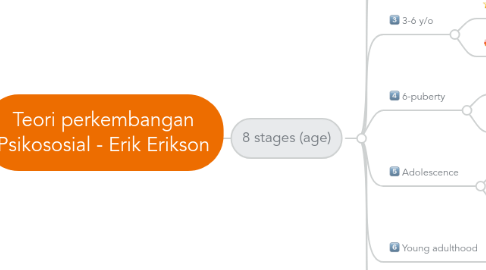
1. 8 stages (age)
1.1. 0-1.5 y/o
1.1.1. Developmental task for stage :
1.1.1.1. Attachment to the mother based on consistency of attention to needs
1.1.2. Psychosocial crisis :
1.1.2.1. Basic trust vs. basic mistrust
1.2. 1.5-3 y/o
1.2.1. Developmental task for stage :
1.2.1.1. Attachment to the mother based on consistency of attention to needs
1.2.2. Developmental task for stage :
1.2.2.1. Gaining control of self and impulses
1.2.2.1.1. e.g: toilet training
1.2.3. Psychosocial crisis :
1.2.3.1. Autonomy vs. shame and doubt
1.3. 3-6 y/o
1.3.1. Developmental task for stage :
1.3.1.1. Self-directive and using energy in productive ways, not in activities that produce guilt
1.3.2. Psychosocial crisis :
1.3.2.1. Initiative vs. guilt
1.4. 6-puberty
1.4.1. Developmental task for stage :
1.4.1.1. Developing persistence, especially in school activities but also in physical and social skills
1.4.2. Psychosocial crisis :
1.4.2.1. Industry vs. inferiority
1.5. Adolescence
1.5.1. Developmental task for stage :
1.5.1.1. Dependency of childhood ---> independent identity and possible career choice
1.5.2. Psychosocial crisis :
1.5.2.1. Identity vs. role diffusion
1.6. Young adulthood
1.6.1. Developmental task for stage :
1.6.1.1. Fusing one's own identity with that of another person through mutuality and commitment
1.6.2. Psychosocial crisis :
1.6.2.1. Intimacy vs. isolation
1.7. Middle age
1.7.1. Developmental task for stage :
1.7.1.1. Fulfilling family and personal goals
1.7.1.2. Demonstrating concern for future generation
1.7.2. Psychosocial crisis :
1.7.2.1. Generativity vs. stagnation
1.8. Old age
1.8.1. Developmental task for stage :
1.8.1.1. Reviewing one's life
1.8.1.2. Deciding that it contains order and meaning
1.8.2. Psychosocial crisis :
1.8.2.1. Ego integrity vs. despair
1.8.2.1.1. e.g: Empty Nest Syndrome
